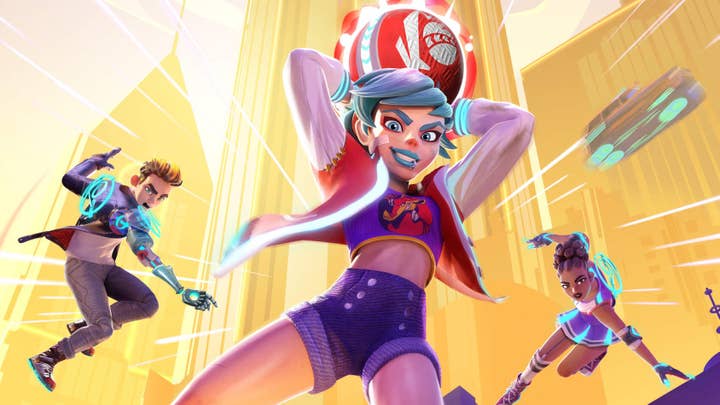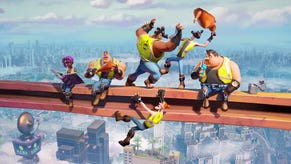Where did Knockout City go wrong?
Velan Studios' Guha Bala discusses the dodgeball multiplayer game's upcoming closure and his hopes for a sequel
Sign up for the GI Daily here to get the biggest news straight to your inbox
Knockout City was one of many casualties in the wave of online games that are scheduled for closure this year.
The multiplayer game, which pits teams of players against each other in a fantastical version of dodgeball, is due to shut down on June 6 – roughly two years after it first debuted. GamesIndustry.biz caught up with Guha Bala, co-founder of Knockout City's developer Velan Studios as well as long-running studio Vicarious Visions, to find out more about the reasons for this once-promising game's demise.
First, Bala emphasises that Knockout City got off to a strong start when it was published as a mid-priced premium title by Electronic Arts, with an additional boost thanks to its inclusion on Xbox Game Pass.
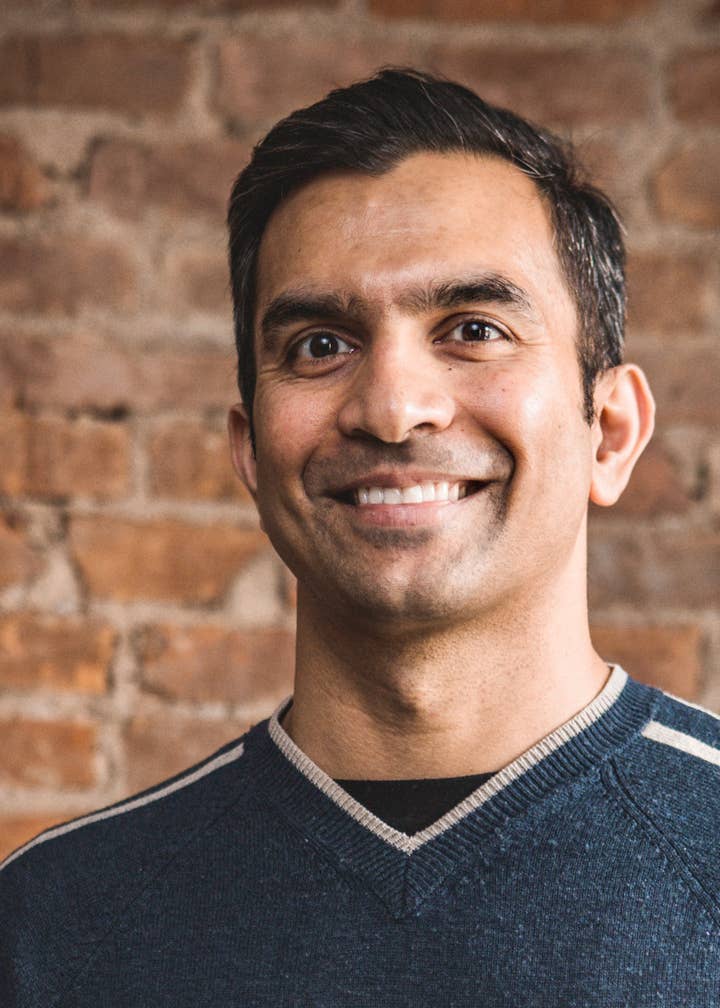
"We were really thrilled with the initial userbase as well as the audience reception," he says. "But by the time we had launched, mid-price premium was pretty uncommon for multiplayer-only titles. Most of those had converted to free-to-play titles, so the competitive environment changed for pricing. It sold fairly well but not well enough to as a mid-price premium title to continue to support an additional flow of content."
As a result, Knockout City also went free-to-play one year after launch, with Velan dropping EA as publisher and handling the game independently. The business model changed, but the developer was still determined to avoid some of the more divisive strategies used to survive in the free-to-play space.
"We'd made an early commitment also to make it cosmetics-only microtransactions, not going the loot box route or other kinds of routes – and certainly no pay-to-win because it's not the healthy essence of a competitive game," Bala says.
"When we released the free-to-play version, we had a couple different challenges. Some of it was macro and actually can be generalized to all the different games that are shutting down right now."
The macro phenomenon he refers to first became apparent around September last year. While the free-to-play Knockout City received a good inflow of users after the transition, the developer experienced a dramatic drop-off in both retention and monetisation around the end of August. This, Bala notes, did not match with the seasonal variations his team expected – for example, the return to school reducing the amount of time and money spent by young players. But when Velan investigated further and spoke to other companies in similar positions, it realised there was a much bigger factor.
"My hope is we can come back with a Knockout City in the future. Of course, that's not a promise"
"We found that inflation was hitting really hard around the world, especially in East Asia where free-to-play really rules. Inflation and currency devaluation was really crimping on discretionary spend and affecting all games that were free-to-play at the time. Your metrics for retention needed to be much higher to break even because both that and monetisation were moving in a negative direction.
"We also saw currency deflation affect our Western European audience as well. In some places, savings rates had been higher during pandemic and so people were eating into their savings rather than contracting spending, even though inflation was dropping income. We saw that around the US economy and a few others."
The economics for newer free-to-play games were becoming unsustainable. Velan Studios had strategies it could try to improve retention, but most were not tenable for a game that was already live, as they would affect the metagame structure or player progression. So the studio made the decision to sunset Knockout City – the question was: when?
The team wanted to gain a few more months of experience with free-to-play and live service games, and also do right by the community that had already been investing in the game. Committing through to the end of the ninth season of content would give Velan a full two years of experience with Knockout City, and one year with the free-to-play model.
"We don't want to go out with a whimper, we want to go out with a bang," says Bala. "We want to make sure that people get a lot of value out of the creative work that we do. Ultimately, that's what makes our work meaningful. I mean, we need to have sustainable economics, but the creative work is what makes us do what we do.
"I think it's also a good time for us to take pause and see what worked, what are we going to improve, how do we bring this back? And that's really my hope is that we can come back with Knockout City in a sequel format sometime in the future. Of course, that's not a promise. We have to work through things but it is actually something that I hope we could do."
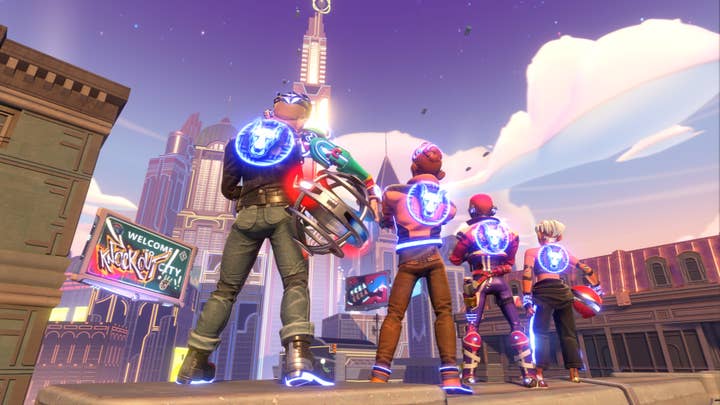
For now, the priority is taking stock of the lessons that can be learned from Knockout City's short lifespan. Bala expects this to be a long list, but the biggest lesson remains the monetisation.
"A cosmetics-based, free-to-play game, while it's really appealing to us as gamers, requires massive scale to be economically sustainable," he explains. "It's sort of an all-or-nothing thing, which is a dull view of the world in a sense because it's like if you want to do something creatively new, it can't be the right set up in that business model unless you can imagine it being enormous. So what do you do in that situation? Are there different ways of approaching a premium title with a service on top of that? Are there different types of user experiences that you can have where you can offer gameplay items but not pay-to-win?
"The cosmetics-led games that we know of today and are generally successful, many of them do have loot boxes. Most mobile titles on a global basis, outside of Western markets, also have loot boxes. It's something that we're not very fond of, and it'll present a lot of challenges in an emerging sense from a regulatory standpoint as well. But you can't have your cake and eat it too. We have to figure out the right economic balance to be able to do something new and provide something that's of real value to players, and then have an economic system that works. [The Knockout City] one didn't."
"A cosmetics-based, free-to-play game, while appealing to gamers, requires massive scale to be sustainable"
He suggests that indie studios looking to bring something new and novel in the space need to do so on a smaller scale, aiming for hundreds or thousands or perhaps low millions of users.
"There are types of propositions that rely on you being No.1 or No.2 in the world to actually even make it make sense," he says. "If you're really trying to do innovation, that's hard to do."
Looking at Knockout City's structure as a game, Bala remains confident that Velan got a lot right: the moment-to-moment mechanic of catching and throwing, the competitive play experience, the team-based set-up. But he acknowledges the meta structure wasn't catering enough to everyone, particularly players who didn't have the twitch skills to excel at Knockout City. Players that did got a lot out of the game, but for many there's a "limit to your expertise in terms of how fast your thumb moves." Addressing this, he believes, will help with retention in future.
"We needed to offer more pathways for growth for those players – how they keep earning, keep learning and keep progressing, and that kind of thing. And I think that's a systems-based approach to look at how we approach products and games in the future. At Velan, I think we have been heavily about, 'What is that initial user experience? What's the user experience from a moment-to-moment standpoint? How do we fundamentally innovate in that?' [In the future] we'll have a heavier emphasis on how you carry all forms of skill forward and sustain those all the time."
We recently spoke to analysts and publishers about the current wave of online games due to close, and we ask Bala for his take on whether there is a trend to be seen here. Again, he notes that the macroeconomic factors – the impact of inflation, and so on – are hitting companies harder than it may have in the past, but adds that previous economic turbulence was weathered by the fact the industry was entirely focused on premium products. When players commit $40-plus to a new game, they are more committed to that title.
"When it comes to microtransaction economy and the free-to-play economy, it's a very transient, broader group," he says. "And so for that group it really is about discretionary spend. When incomes go down and the savings rate goes down, your willingness to transact goes down as well. There's a relationship between investment and retention, so it also means your retention numbers go down. The economics that allow you to get to scale quickly drive in reverse and so I think most of the service-based businesses encountered the same thing last fall.
"If you don't already have scale and can ride it through, it's important to call time"
"If you don't already have scale where you're right side up and you can ride it through, it's important to call time."
There's also arguably a limit to how many popular live service games the market can sustain, especially for titles aiming at a large audience. Players only have so much time, and are therefore likely to commit to one or perhaps a handful of titles, which may also be dictated by which games their friends are playing.
Bala agrees with this, although suggests it also runs deeper: "Most markets have this sort of a mass audience product that can engage lots of people but at a low price, and then a lot of niche products that serve subsets of customers extremely well.
"In the live service context, you have Fortnite on one side where the ARPUs are actually quite low relative to other titles but they just have an enormous playerbase. And then you have games like Warframe or Runecraft that are considerably smaller, but with a very loyal userbase because they serve their interests extremely well and have higher ARPUs.
"Both have room but the [games] in the middle really belong to neither and can't survive. They can't be caught in the middle saying, 'Well, I'm neither big enough to satisfy the big need, nor am I deep enough or specialized enough to solve the niche need'. And the two pursue very different monetisation strategies and sustainability strategies. So you either have to be among the top two or three huge ones, or a focused product for niche audiences.
"And what I'm saying is nothing really novel. This is like a classic Michael Porter competitive strategy from 1980, that kind of thing. You can have a focused strategy as a company serving a niche or you can have a differentiated strategy but for everybody."
This can be done within a single title. Bala points to FIFA as a prime example; the premium game appeals to the broad market and, as he puts it, "really bankrolls the basic game development" to help sustain the franchise. But then FIFA Ultimate Team serves a smaller audience, and serves it well, monetising highly as a result.
"If I personalise it to our own game, Knockout City could go broad but it's tough because at its heart it's a competitive game like Smash Brothers, and the maximum value belongs to a relatively focused competitive audience – even though it has accessible mechanics and that kind of thing. So what we have to figure out is how do we provide something that can be broad potentially but, from a monetisation standpoint, make sure that we're serving our niches extremely well."
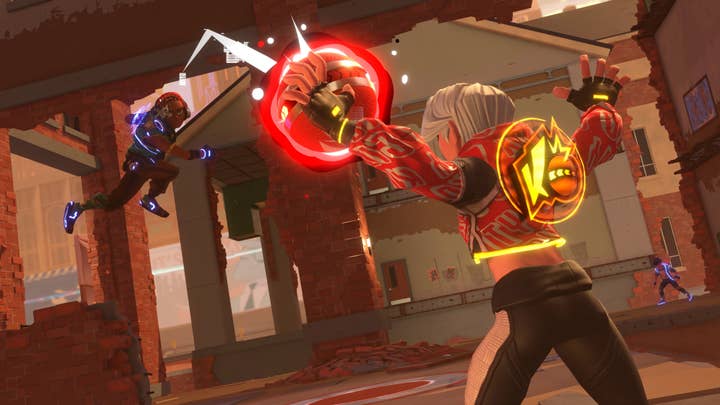
As for the market at large, Bala believes we're likely to see more online and live service games close in the near future. The current wave he puts down to timing; particularly for developers supported by public companies, noting "the good time to bury bad news is at the end of the quarter."
"You take your hits and then you move on," he says. "We probably will see some more coming. Most of the examples that are coming right now are folks that were not DOA games. The games had promising starts and had promising indicators that they could go to scale, but have altered in the middle and then we saw the macroeconomic changes and folks are like, 'Okay, we've got to call time.'
"It's not the end of games-as-a-service, it's not the end of great games or anything like that, but it is a cycle. I think it's important to take stock. The world where everything could be free-to-play and still leave sustainable economics to keep them going, that worldview needs an adjustment. Let's say the world hasn't changed, but the worldview needs an adjustment."
Sign up for the GI Daily here to get the biggest news straight to your inbox
